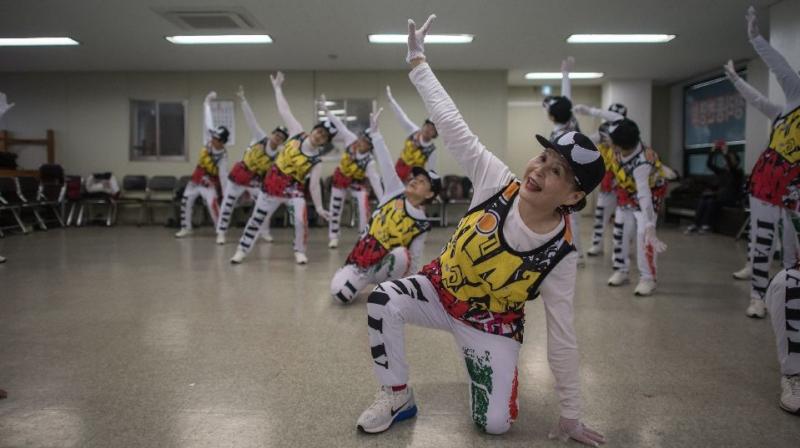Sociability, better healthcare and nutrition aid longevity in South Koreans: Experts

South Korea: Waving white pom poms in the air, dozens of grey-haired cheerleaders in matching red and white uniforms hop and skip to K-pop music that fills the practice room.
Halfway into their two-hour practice session, most of the elderly dancers are panting and sweating, but do not let their bad knees or back pain stop them from what they say is keeping them healthy and youthful.
"Because I come here, I don't need to take any medicine," said 82-year-old Oh Geum-Nyu. "Although I'm ageing on the outside, this keeps me young at heart."
Oh is one of the oldest members of Cheer Mommy, a 30-member cheerleading squad with an average age of 75, based in Samcheok, on South Korea's east coast.
Life expectancy in Asia's fourth-largest economy is accelerating rapidly, and for women born in 2030 it could stretch to nine decades on average, the longest in the world, according to research published in The Lancet medical journal.
The study by researchers at Imperial College London noted improved nutrition and broader access to health care as some of the reasons behind the phenomenon. Some South Korean experts also point to social factors behind longevity.
"Their love for informal gatherings and forging new personal bonds can be a source of energy," said Chung Soon-Dool, a social welfare professor at Ewha Women's University in Seoul.
Most South Korean women in their 60s and older spent much of the lives in a strongly patriarchal society where women were expected to stay at home and raise the children.
Some are now embracing pursuits of their own choosing for the first time after retiring as the "caretaker". "I was done raising my seven grandchildren when my friend told me about this place," said Cheer Mommy member Ahn Young-Ja, 65.
Lee Pal-Soon, 82, who also takes singing classes when she is not cheerleading, said she was enjoying the "second chapter" of her life after marrying off her five children.
Some are choosing to keep their brains active by going back to school, such as 88-year-old Kim Soon-Sil, who is among some 370 students aged 60 and up studying at Ilsung Women's School in Seoul.
Kim, who grew up under Japan's 1910-1945 colonial rule of Korea, had to leave school at 13 and it was not until seven decades later that she could fulfil her longing to continue her studies in history and English. "I can feel small changes to my health every day, but if my health permits, I want to enroll in university," said Kim.
South Korea's government has rolled out various welfare programmes to accommodate its rising senior population - its men are also set to become the world's longest-lived, according to the Imperial College study - including opening more community centres and organising leisure activities for the elderly.
But experts say the cost could become crippling in the face of a looming demographic crisis in the country with the world's lowest birthrate.
Around 6.5 million out of the country's 50 million population were 65 years or older in 2015, and in the next 10 years, one out of five South Koreans will be retired, according to a Statistics Korea report in December. The country's working age population started declining last year, it said, and by 2065 it will be overtaken by the number of retirees.
"It's the question of who will cover the increase in social security cost," said Professor Chung. "It wouldn't be a problem if the number of young people were also rising, but that's not the case." Authorities need to consider raising the retirement age, said Ha Jung-Hwa, social welfare professor at Seoul National University.
"It's important the government introduces new policies to keep healthy and skilled senior citizens longer in the job market," she added.
Cheer Mommy started out as a local authority leisure programme, but the elderly squad now regularly travels across the country to compete in national tournaments against rivals decades their juniors.
With the youngest member aged 63, the choreography lacks dynamic stunts like back flips or somersaults. It takes them twice as long to remember the routines, and instructor Yoon Bok-Ja said: "They are slow like turtles but they don't give up until they are perfect."
The bubbly grannies quickly changed into their next uniform -- graffiti-printed jerseys, white tracksuit bottoms and black baseball caps -- for a number set to Gangnam Style star Psy's latest hit Daddy, chanting: "Hip hop! Youth! To 100 years!"

